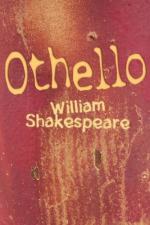|
This section contains 1,025 words (approx. 4 pages at 300 words per page) |

|
Self-Reflexivity in "Othello"
Summary: An examination of self-relexivity, in which the characters themselves talk to the audience, in William Shakespeare's "Othello." Iago fulfills this role in the play.
Self-reflexivity, or a `self-reflexive' text can be defined as a structure which `looks back at itself ... and which sometimes breaks the boundaries between itself and the world' . Similarly a piece of self-reflexive work can also allow a text or a play to make an audience or reader aware that what they watch, or read, is actually not `real life' but instead a representation.
To fully grasp this concept of self-reflexivity, we should perhaps look at what some people suggest as the opposite of such a device: the `Classical Hollywood Narrative' is a technique used in most films to deceive the viewer into believing that what they are witnessing is indeed real life. The audience is then left as the voyeur over the proceedings on the screen. This will be examined later while considering Oliver Parker's screenplay.
However, in a play such as Shakespeare's Othello, some might argue that...
|
This section contains 1,025 words (approx. 4 pages at 300 words per page) |

|


